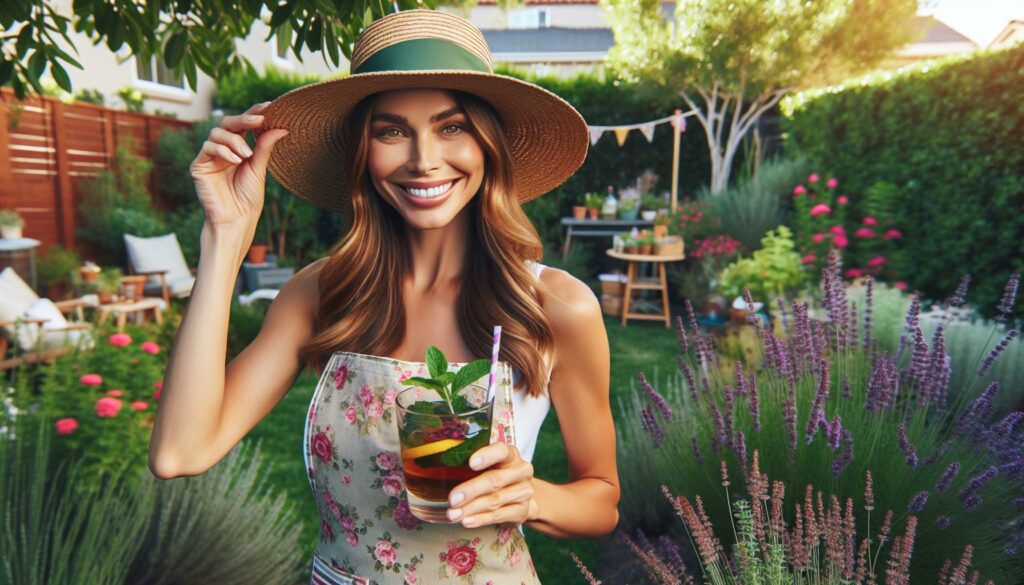After spending countless hours tending to my garden I’ve discovered that the secret to thriving plants isn’t just about soil and sunlight. I’m excited to share my favorite gardening drink recipes that’ll give your plants the boost they need to flourish.
Whether you’re a seasoned gardener or just starting your green journey you’ll love these natural drink solutions. From compost tea to banana peel water these nutrient-rich concoctions work wonders for plant growth and soil health. I’ll show you how easy it is to create these powerful plant drinks using ingredients you probably already have in your kitchen.
Key Takeaways
- Gardening drinks come in two forms: nutrient-rich solutions for plants and botanical beverages made from garden ingredients like herbs, edible flowers, fruits, and vegetables
- Key ingredients for garden-inspired drinks include mint, lavender, hibiscus, borage, and other herbs and flowers that can be easily grown at home in a dedicated drink garden
- Proper storage techniques are essential – dried herbs last 6-12 months in glass jars, while concentrated preparations like syrups can be preserved for up to 6 months when refrigerated
- Having the right tools is crucial: mason jars for infusing, fine-mesh strainers for filtering, glass spray bottles for plant solutions, and basic gardening equipment for harvesting
- Fresh garden drinks offer multiple health benefits, including improved hydration, better digestion, increased nutrient absorption, and enhanced immune function
Gardening Drink
A gardening drink encompasses beverages crafted from garden-fresh ingredients or nourishing plant-based mixtures designed to support both human health and plant growth. I’ve discovered these drinks fall into two categories: nutrient-rich solutions for plants and refreshing botanical beverages for human consumption.
Common Ingredients Found in Garden-Inspired Beverages
Garden-inspired drinks incorporate freshly harvested ingredients straight from the garden bed. Common components include:
- Herbs: Mint, basil, rosemary, lemon balm
- Edible Flowers: Lavender, chamomile, hibiscus, nasturtium
- Fruits: Strawberries, raspberries, blackberries, citrus
- Vegetables: Cucumber, celery, carrots, tomatoes
- Aromatics: Ginger root, lemongrass, fennel
Health Benefits of Garden-Fresh Drinks
Garden-fresh beverages deliver concentrated nutritional benefits:
| Ingredient Type | Key Benefits | Notable Nutrients |
|---|---|---|
| Herbs | Anti-inflammatory, digestive aid | Antioxidants, essential oils |
| Berries | Immune support, heart health | Vitamin C, flavonoids |
| Vegetables | Hydration, detoxification | Minerals, fiber |
| Edible Flowers | Stress relief, skin health | Polyphenols, vitamins |
- Enhanced hydration through natural electrolytes
- Improved digestion from active enzymes
- Increased nutrient absorption
- Reduced inflammation from phytonutrients
- Strengthened immune function through vitamin complexes
Popular Garden-to-Glass Recipes
I’ve crafted these recipes through years of experimenting with garden-fresh ingredients to create unique beverages that showcase the natural flavors of herbs flowers.
Herbal Infused Waters
My go-to herbal water combinations include mint-cucumber-lime rosemary-lemon thyme-ginger. I steep 2 cups of fresh herbs in 1 quart of filtered water for 4 hours before straining. Fresh mint releases its oils in cold water while rosemary benefits from a quick hot water infusion followed by cooling. These infused waters stay fresh for 3 days when stored in an airtight container in the refrigerator.
Flower-Based Cocktails and Mocktails
I create signature drinks using edible flowers like lavender hibiscus borage violets. Here are my tested combinations:
- Lavender Lemon Spritzer: 1 oz lavender syrup 4 oz prosecco fresh lemon juice
- Hibiscus Margarita: 2 oz hibiscus tea 1.5 oz tequila lime juice agave
- Violet Gin Fizz: 2 oz violet-infused gin club soda egg white fresh violets
- Borage Cucumber Cooler (Mocktail): Muddled cucumber borage flowers mint leaves sparkling water
For flower syrups I use a 1:1 ratio of sugar to water adding 1/4 cup dried flowers or 1/2 cup fresh flowers per cup of liquid. The syrup steeps for 20 minutes before straining keeps for 2 weeks refrigerated.
| Flower Type | Steeping Time | Flavor Profile | Best Pairings |
|---|---|---|---|
| Lavender | 15-20 min | Floral herbal | Lemon citrus |
| Hibiscus | 10-15 min | Tart berry | Lime agave |
| Violets | 20-25 min | Sweet delicate | Gin elderflower |
| Borage | 5-10 min | Subtle cucumber | Mint citrus |
Growing Your Own Drink Garden
After mastering various drink recipes, I’ve created a dedicated space in my garden for beverage-specific plants. This specialized garden combines aromatic herbs with edible flowers to produce fresh ingredients for both botanical drinks and plant-nourishing solutions.
Best Herbs and Edible Flowers to Grow
My drink garden thrives with these essential herbs and flowers:
Herbs:
- Mint (Spearmint, Peppermint): Grows in partial shade, spreads rapidly
- Lemon Balm: Tolerates most soils, produces citrus-scented leaves
- Chamomile: Prefers full sun, blooms throughout summer
- Rosemary: Requires well-draining soil, grows year-round
- Thyme: Thrives in rocky soil, drought-resistant
- Basil: Needs 6 hours of sunlight, warm temperatures
Edible Flowers:
- Borage: Self-seeds easily, produces blue star-shaped flowers
- Lavender: Requires full sun, sandy soil
- Hibiscus: Grows in containers, needs protection from frost
- Nasturtium: Tolerates poor soil, provides edible leaves and flowers
- Violets: Grows in partial shade, blooms in spring
- Calendula: Reseeds readily, flowers continuously
- Plant Spacing
- Position mint in containers to control spreading
- Space tall herbs 18 inches apart
- Group plants with similar water needs together
- Soil Requirements
- Use organic compost for herbs
- Maintain pH between 6.0-7.0
- Add mulch to retain moisture
- Harvesting Guidelines
- Pick herbs before flowering for best flavor
- Harvest flowers in early morning
- Cut stems above leaf nodes to promote growth
- Seasonal Care
- Prune woody herbs in early spring
- Divide perennial herbs every 3 years
- Protect tender plants from frost with row covers
- Pest Management
- Plant companion flowers to attract beneficial insects
- Use neem oil for organic pest control
- Remove damaged leaves promptly
Essential Tools and Equipment
Creating garden-inspired drinks requires specific tools for both plant cultivation and beverage preparation. I’ve compiled a comprehensive list of essential equipment based on my experience making botanical drinks and plant-nurturing solutions.
Basic Garden Tools
- Hand trowel for harvesting root herbs like ginger dandelion
- Sharp pruning shears for clean cuts on stems flowers
- Garden gloves to protect hands during harvesting foraging
- Watering can with rain-style head for gentle plant hydration
- Plant markers to identify different herbs flowers
- Garden fork for loosening soil around established plants
- Collection basket with breathable design for fresh harvests
- pH meter to monitor soil conditions
- Glass mason jars (32 oz 64 oz) for infusing storing drinks
- Fine-mesh strainer to remove botanical particles
- Cheesecloth for filtering delicate ingredients
- Digital kitchen scale for precise measurements
- Glass spray bottles for misting plant solutions
- Stainless steel muddler for crushing herbs flowers
- Long-handled wooden spoon for stirring infusions
- Heat-resistant measuring cups (2-cup 4-cup capacity)
- Airtight storage containers for dried ingredients
- Label maker water-resistant tags for dating solutions
| Equipment Type | Recommended Size | Material |
|---|---|---|
| Mason Jars | 32-64 oz | Glass |
| Spray Bottles | 16-24 oz | Glass |
| Strainer Mesh | 6-8 inches | Stainless Steel |
| Storage Containers | 1-2 quart | Glass/BPA-free |
Storage and Preservation Methods
I’ve developed effective storage techniques to maintain the freshness of garden ingredients for extended periods, ensuring a consistent supply of botanical beverages throughout the year. Here’s what I’ve learned about preserving garden-fresh ingredients for drinks.
Drying and Storing Garden Ingredients
I dry herbs and flowers at peak harvest using three proven methods:
- Air-drying: Hang bundles of herbs upside down in a dark, well-ventilated space at 60-70°F for 7-14 days
- Dehydrator: Process clean herbs at 95°F for 2-4 hours until crisp
- Oven-drying: Spread herbs on parchment at 170°F for 2-3 hours, leaving door slightly open
Storage specifications for dried ingredients:
| Container Type | Storage Life | Optimal Temperature |
|---|---|---|
| Glass jars | 6-12 months | 65-70°F |
| Metal tins | 4-6 months | 60-65°F |
| Paper bags | 2-3 months | 65-70°F |
Making Garden Drink Concentrates
I create concentrated preparations to maximize storage efficiency:
- Herbal syrups: Combine 2:1 ratio of sugar to herb-infused water, store up to 6 months refrigerated
- Flower essences: Steep fresh petals in neutral spirits for 3-4 weeks, strain and store for 12 months
- Frozen cubes: Process fresh herbs with water, freeze in ice cube trays for 3-4 months
| Type | Shelf Life (Refrigerated) | Dilution Ratio |
|---|---|---|
| Simple syrups | 6 months | 1:4 with water |
| Tinctures | 12-24 months | 10-15 drops per cup |
| Frozen cubes | 3-4 months | 1-2 cubes per glass |
Beverage Creation
Growing and using garden-fresh ingredients for gardening drink has transformed my approach to both gardening and beverage creation. I’ve discovered that with the right tools knowledge and dedication anyone can create a thriving drink garden that yields beautiful and beneficial ingredients year-round.
Whether you’re interested in crafting nutrient-rich solutions for your plants or making refreshing botanical beverages I encourage you to start small and experiment. From my experience the joy of harvesting fresh herbs and flowers for drinks adds an exciting dimension to traditional gardening.
Remember that success comes from mindful planning proper equipment and effective preservation techniques. I’m confident that once you taste your first garden-fresh drink you’ll be inspired to expand your botanical beverage journey.

